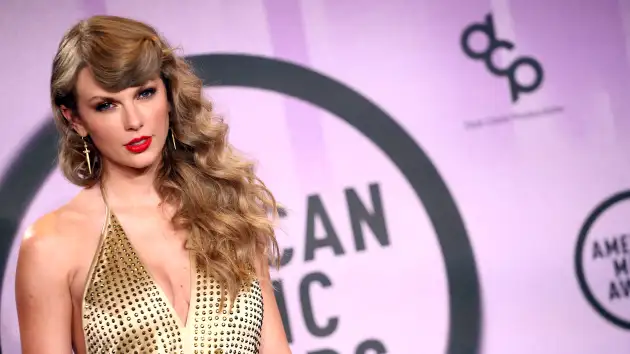As Ftx Bled Cash and Execs Encouraged Caution, Sam Bankman-Fried Pushed for a Deal With Taylor Swift
Important points
- According to individuals who spoke to CNBC, Sam Bankman-Fried was attempting to secure a sponsorship agreement with Taylor Swift while FTX's financials were suffering from the crypto sell-off earlier this year.
- Over a three-year period, the agreement would have cost the now-bankrupt cryptocurrency startup more than $100 million.
- The purchase, according to former executives, would have been disastrous for FTX and was a prime illustration of Bankman-disregard Fried's for their counsel.
 |
| After winning six awards at the 50th Annual American Music Awards on November 20, 2022, at the Microsoft Theater in Los Angeles, California, US singer Taylor Swift poses in the press area. Valerie Macon | AFP | Getty Images |
FTX executives begged company founder Sam Bankman-Fried to conserve cash and cease spending hundreds of millions of dollars on celebrity sponsorships earlier this year as the crypto crash was depleting the industry of liquidity.
The 30-year-old entrepreneur, who had relied on branding and excitement to transform his cryptocurrency exchange from a fledgling to a veteran, however, was adamant about bringing on one more well-known figure.
Three individuals with close ties to FTX and Bankman-Fried told CNBC that the former CEO pushed hard for a collaboration with Taylor Swift, the 11-time Grammy Award winner. According to the people, who requested anonymity due to confidentiality agreements, the deal was almost completed until it fell through in the spring. It would have cost the now-bankrupt corporation more than $100 million over three years.
The alliance would have been disastrous for FTX due to the high price tag, according to the former executives who had firsthand knowledge of the negotiations. A half-dozen former firm executives and business partners claimed that Bankman-determination Fried's to complete the Swift purchase despite the deteriorating business environment followed a pattern of disregarding his lieutenants and going it alone.
Prior to now, The Financial Times reported that FTX and Swift had discussions on a prospective sponsorship.
An organization with minimal controls over its CEO and no board of directors to hold him responsible contributed to Bankman-arrogance. Fried's Bankman-Fried, on the other hand, presented a very different image to the public, portraying himself as a quirky young genius at ease in shorts and a T-shirt or in a suit before Congress who repeatedly professed his belief in effective altruism, a philosophy that encourages the idea of earning a lot of money in order to donate it to the most important causes.
Private investors valued FTX at $32 billion earlier this year, but doubts about the crypto exchange's financial stability and client demands for withdrawals that were denied contributed to the company's collapse last month. Bankman-Fried has persisted in avoiding advisors despite the threat of criminal penalties and years behind bars by making public statements, giving interviews to the media, and tweeting his defense.
 |
| CEO Sam Bankman-Fried Bloomberg | Bloomberg | Getty Images |
In a video interview at The New York Times DealBook Summit last week, Bankman-Fried acknowledged that his attorneys are against his current strategy but insisted that he has an obligation to communicate with people and explain what happened. "I don't see what good comes from my just sitting here pretending the outside world doesn't exist," the speaker said.
Bankman-Fried has frequently asserted that FTX's demise was the product of poor management and excessive risk, as evidenced by his DealBook appearance, an interview with ABC's "Good Morning America," and his opinion on a number of podcasts.
Bankman-Fried has asserted that he did not conduct fraud and that he was not aware of the majority of the financial transactions between FTX and his hedge fund, Alameda Research, and FTX. FTX client cash totaling at least $8 billion that were utilized to cover Alameda's enormous loan losses are currently unaccounted for.
Going after Swift NFTs
Additionally, Bankman-Fried mismanaged business funds. Shortly after launching FTX in 2019, Bankman-Fried agreed to a $135 million, 19-year naming rights agreement with the NBA's Miami Heat. Additionally, he agreed to sponsorship deals with the Major League Baseball, Formula One, and the Golden State Warriors, as well as secured Larry David's endorsement for a Super Bowl commercial. Among the brand's ambassadors were Gisele Bündchen, Tom Brady, Shaquille O'Neal, Stephen Curry, David Ortiz, and Naomi Osaka.
The creation by the singer of a collection of digital assets with fluctuating value, or non-fungible tokens (NFTs), was a component of the Swift agreement. Beyond that, insiders claimed there was confusion on what Swift would be doing for the business. Internal discussions about a deal with Katy Perry started after the Swift pact broke down, according to one source, and continued as recently as August.
Swift's spokesperson declined to comment, and Perry did not answer CNBC's request for a statement.
While some employees and associates of the company reportedly disagreed with Bankman-decisions, Fried's according to FTX insiders, he immediately surrounded himself with a group of supporters. His style of leadership was described as "insular" by two sources. According to insiders, Bankman-Fried mostly sought counsel from a close-knit group in the Bahamas, where he resided and the company's headquarters sat.
An ex-FTX executive claimed that Bankman-Fried had a propensity to berate workers who differed with him in a way that discouraged others from speaking up. According to sources, when Bankman-Fried became irate, his automatic response was to point the finger at his subordinates. Former insiders claimed that Bankman-Fried presented himself as an approachable CEO as a public relations stunt.
In a message to CNBC, Bankman-Fried expressed his disagreement with the descriptions offered by those former workers. On specifics of the Swift negotiations, he refrained from comment.
In the message, Bankman-Fried said that partnerships were a more contentious topic. She added, "On the margin, I was initially in favor and eventually started pushing back on new ones.
According to filings by John Ray III, the new CEO chosen to restructure FTX, he had never witnessed "such a complete failure of corporate controls and such a complete absence of trustworthy financial information as occurred here" in his 40 years of legal experience, which included Enron's liquidation.
Caroline Ellison, the former CEO of Alameda Research and a former flame of Bankman-Fried, was one of the man's closest confidantes. According to an FTX executive, the two frequently strolled about the fenced-in Nassau headquarters after lunch.
One top deputy claimed that Bankman-Fried went to tremendous measures to avoid interacting with people and avoiding face-to-face confrontations, favoring the encrypted communications apps Signal or Slack. If he didn't agree with a message from a C-level executive, he frequently ignored it.
Another former insider claimed that Bankman-Fried was feared by the staff, adding that "very few individuals were willing to question Sam."
Source: CNBC
Post a Comment